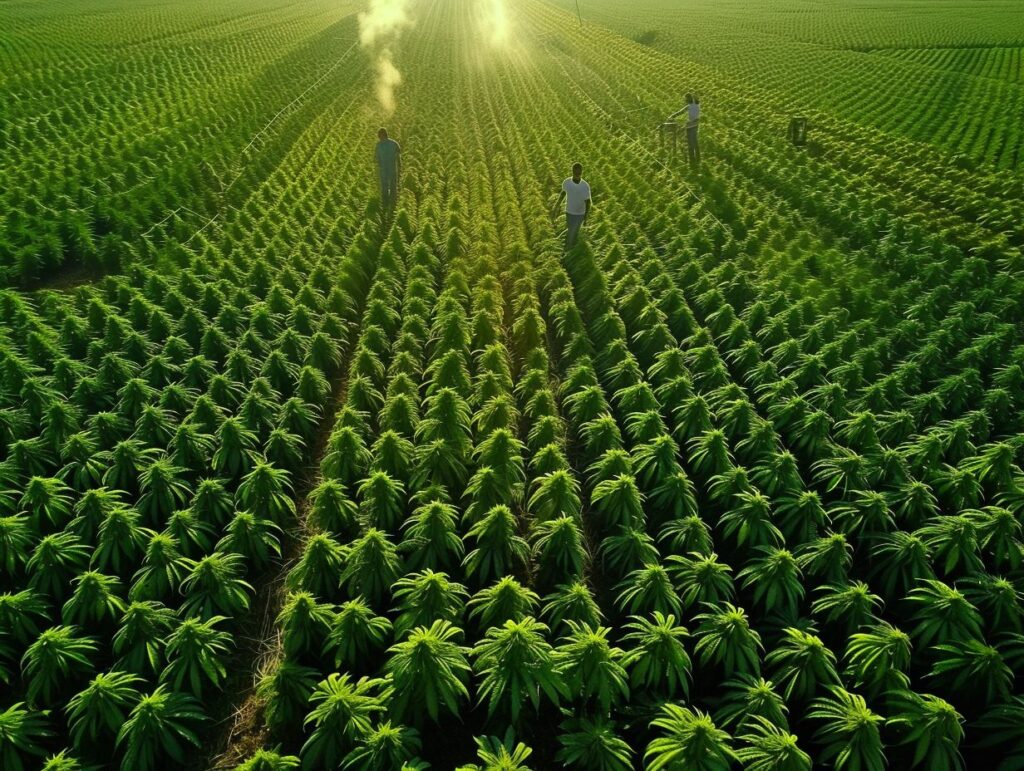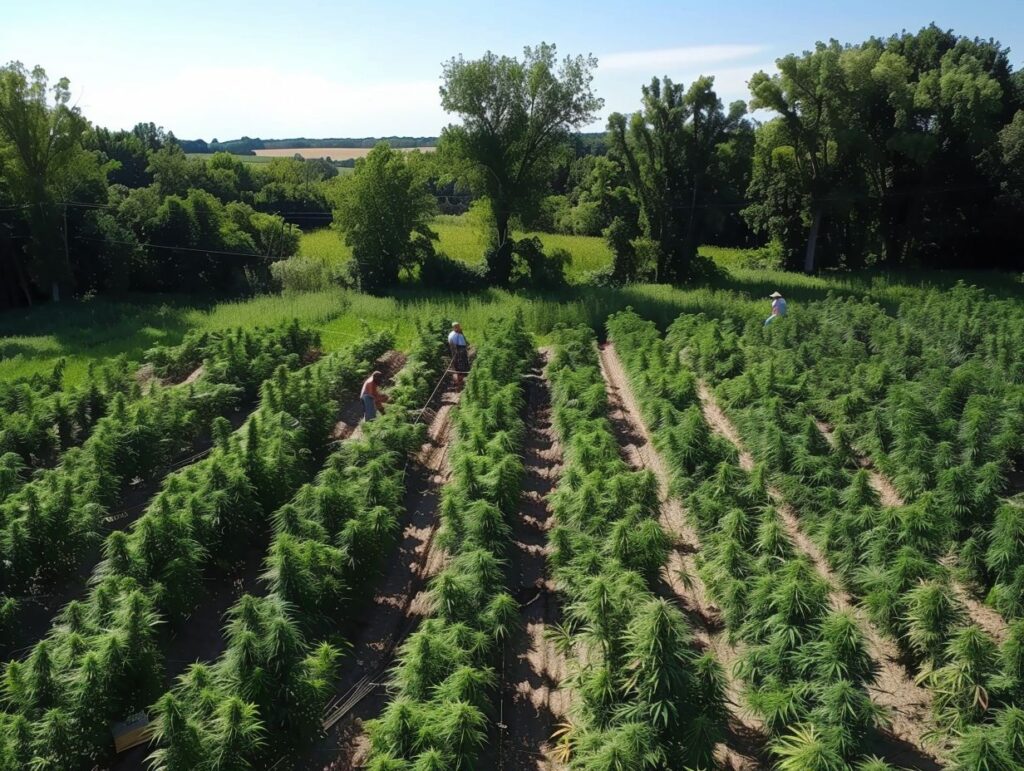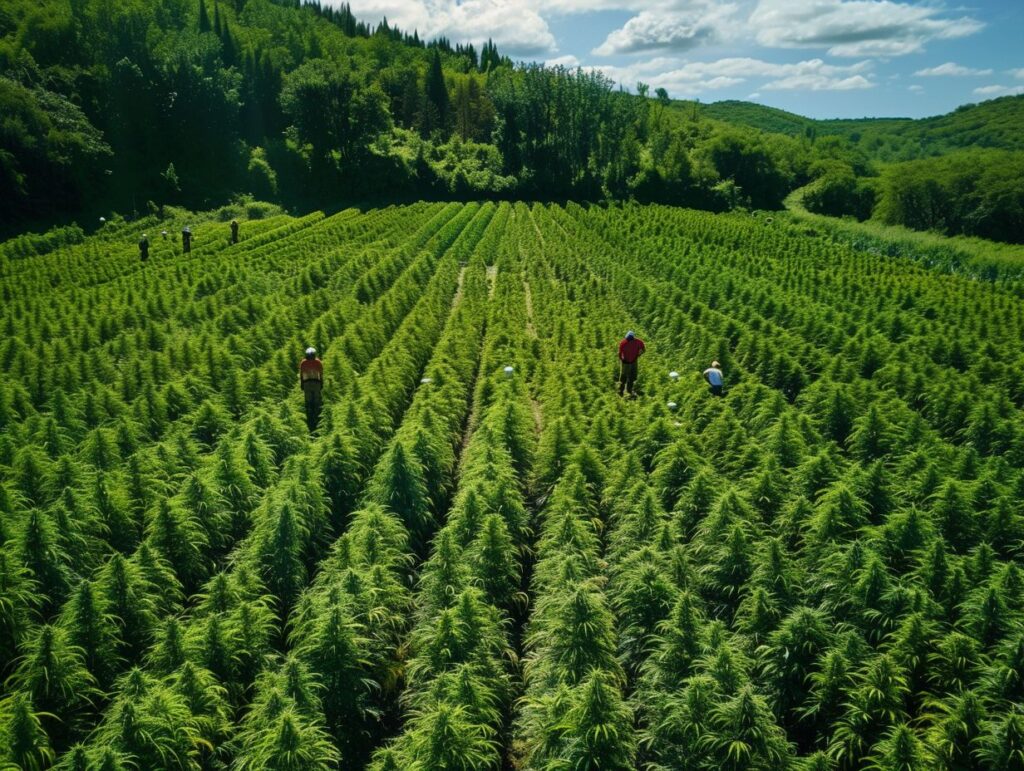Hemp, a versatile and sustainable plant, has a long history in agriculture. From soil regeneration to natural pest control, hemp offers a range of benefits that set it apart from other crops.
We will explore the uses of hemp in agriculture, comparing it to traditional crops and discussing the challenges and controversies surrounding its cultivation.
Join us as we delve into the importance of hemp in agriculture and explore the promising future this plant holds in sustainable farming practices.
What is Hemp?
Hemp, a versatile and sustainable crop, has a long history in agriculture and is known for its numerous benefits and uses.
Its historical significance dates back centuries, with records showing its cultivation for food, fiber, and medicinal purposes. Farmers have valued hemp for its ability to thrive in diverse climates and require minimal pesticides and herbicides. This resilient plant can be used to produce textiles, paper, biofuels, and even biodegradable plastics. Its deep root system also makes it beneficial for soil health by reducing erosion and stimulating microbial activity.
As sustainability becomes a focal point in modern agriculture, the demand for hemp continues to rise as a key player in sustainable farming practices.
History of Hemp in Agriculture
Throughout history, hemp has played a crucial role in agriculture as a sustainable and versatile crop, offering immense benefits to farmers and ecosystems.
This resilient plant has been recognized for its ability to grow in various climates and soil types, requiring minimal maintenance and pesticides. Its deep root system helps prevent soil erosion and improves soil health, making it a valuable crop for sustainable farming practices.
Hemp’s economic importance cannot be understated, with its fibers, seeds, and oils being used in a diverse range of industries including textiles, food, and cosmetics. The cultivation of hemp has the potential to revolutionize farming methods by providing a profitable and eco-friendly crop alternative.
How has Hemp been Used in Agriculture Throughout History?
Hemp has been utilized in agriculture throughout history for its versatile applications, economic benefits, and positive impact on soil health and ecosystems.
From ancient times to the present day, farmers have valued hemp for its ability to produce fibers for textiles, oils for cooking and skincare, and seeds for food and animal feed.
The cultivation of hemp is a sustainable practice as it requires minimal water and pesticides compared to other crops, making it an environmentally friendly choice. Hemp plants have deep roots that aid in preventing soil erosion and restoring nutrients to the earth, promoting overall soil health and biodiversity in agricultural landscapes.
Benefits of Hemp in Agriculture
The benefits of incorporating hemp in agriculture are vast, including soil regeneration, carbon sequestration, biodiversity enhancement, and sustainable cultivation practices.
Hemp’s remarkable root system has the ability to break up compacted soil, improving water infiltration and reducing erosion. As a bio-accumulator, hemp can absorb toxins from the soil, acting as a natural purifier. Hemp cultivation requires minimal chemical inputs, promoting healthier ecosystems and reducing environmental impact. By rotating hemp crops, farmers can prevent soil degradation and promote biodiversity by providing habitat for beneficial insects and wildlife. Sustainable hemp cultivation practices contribute to a more resilient and ecologically balanced agricultural system.
Soil Regeneration
Hemp plays a crucial role in soil regeneration by improving soil health through its deep roots, efficient nutrient uptake, and biodegradable properties.
The cultivation practices of hemp involve minimal pesticide and fertilizer use, thereby reducing chemical runoff and soil contamination. Farmers who grow hemp often practice crop rotation, which helps in breaking pest cycles and improving soil structure. Hemp plants have the ability to suppress weeds, reducing the need for herbicides. When hemp is harvested, its residues can be incorporated back into the soil, enriching it with organic matter and promoting microbial activity for overall soil fertility.
Natural Pest Control
Hemp acts as a natural pest control agent, maintaining ecosystem balance and biodiversity by reducing the need for chemical pesticides in agricultural practices.
This sustainable cultivation practice involves utilizing the natural properties of hemp to repel pests, such as insects and weeds, without harming beneficial organisms. By minimizing the use of harmful chemicals, hemp contributes to the preservation of essential pollinators like bees and butterflies. Hemp cultivation supports a healthy soil ecosystem, fostering beneficial microbial activity and enhancing overall soil health. This holistic approach to pest management not only safeguards the environment but also promotes long-term sustainability in agriculture.
Carbon Sequestration
Hemp contributes to carbon sequestration, aiding in environmental preservation by absorbing carbon dioxide during its growth cycle and promoting carbon-neutral production practices.
Hemp’s rapid growth and deep root system make it an efficient carbon sink, pulling in large amounts of CO2 from the atmosphere. This process helps to offset greenhouse gas emissions, ultimately mitigating the impacts of climate change. By choosing hemp-based products over conventional alternatives, individuals can actively support sustainable practices and contribute to a healthier planet. The versatility of hemp also extends to its ability to be used in various industries, offering a renewable and eco-friendly alternative to resource-intensive materials.
Diversification of Crops

Hemp promotes the diversification of crops in agriculture, fostering innovation and adaptation to changing environmental conditions for sustainable farming practices.
This versatile plant is known for its ability to grow in a variety of environments, making it a valuable addition to crop rotations. By including hemp in farming operations, farmers can improve soil health, reduce pests and diseases, and even enhance biodiversity on their land. The introduction of hemp into crop rotations not only helps to break cycles of monoculture that can deplete soil nutrients but also provides new opportunities for farmers to explore different markets and products. Hemp plays a crucial role in moving agriculture towards a more sustainable and resilient future.”
Uses of Hemp in Agriculture
Hemp finds diverse applications in agriculture, ranging from fiber production for textiles to seeds for the food industry and extraction of medicinal compounds.
Beyond these commonly known uses, hemp also plays a crucial role in sustainable farming practices. Its deep root system helps to prevent soil erosion and improve soil health, making it an excellent rotational crop. Hemp can be used in the manufacturing of biodegradable plastics, building materials, and biofuels, showcasing its versatility in reducing environmental impact.
The crop’s fast growth rate and minimal need for pesticides further contribute to its appeal as an eco-friendly option for farmers in various industries.
Hemp Fiber
Hemp fiber is a valuable resource in agriculture, known for its versatility in textile production and industrial applications.
It provides numerous benefits beyond just being a sustainable and eco-friendly alternative to traditional fibers. Hemp cultivation requires minimal water and pesticides, making it a highly sustainable crop. The fiber derived from hemp plants is strong, durable, and biodegradable, making it an ideal choice for various industries, including clothing, paper, construction, and even automotive manufacturing.
Hemp fiber has excellent insulating properties, which makes it a preferred material for creating environmentally friendly building materials. The versatility of hemp fiber contributes significantly to the move towards more sustainable and environmentally conscious practices across industries.
Hemp Seeds
Hemp seeds are rich in nutrition and offer various health benefits, in addition to their potential for biofuel production.
Loaded with essential fatty acids, protein, and minerals, hemp seeds are a powerhouse of nutrition. They are a great source of omega-3 and omega-6 fats, providing a perfect balance for a healthy heart. They contain high-quality plant-based protein, making them a valuable addition to vegetarian and vegan diets. Hemp seeds are also rich in vitamins and minerals like vitamin E, magnesium, phosphorus, and potassium, contributing to overall well-being. Their versatility extends to eco-friendly biofuel production, offering a sustainable and renewable energy source.
Hemp Oil
Hemp oil is a valuable product in the food industry, recognized for its health benefits and wellness properties.
It is rich in essential fatty acids like omega-3 and omega-6, which are beneficial for heart health and reducing inflammation. Hemp oil is a great source of antioxidants and vitamins, further enhancing its nutritional value. Many chefs and food manufacturers are incorporating hemp oil into their recipes to offer consumers a healthier alternative. Its mild nutty flavor adds a pleasant taste to various dishes, making it a versatile ingredient for both savory and sweet creations.
Hemp Biomass
Hemp biomass provides a sustainable resource for various applications, offering an alternative to traditional resources and promoting biodegradable solutions.
It plays a vital role in resource efficiency by requiring less water and pesticides compared to many other crops, making it an environmentally friendly choice. Hemp biomass can be utilized in the production of biofuels, textiles, construction materials, and even as an ingredient in eco-friendly plastic alternatives. Its biodegradable nature ensures that products made from hemp will not contribute to long-term environmental pollution, further enhancing its appeal as a sustainable resource.
Hemp vs. Other Agricultural Crops
Comparing hemp with other agricultural crops reveals its potential for growth, market demand, ongoing research, and innovative applications.
While traditional crops have long been pillars of agricultural production, hemp stands out for its versatile nature that extends beyond traditional uses such as food and textiles. The increasing demand for hemp-derived products like CBD oil has sparked a wave of interest in cultivating hemp for its medicinal properties. Researchers are exploring the potential of hemp in sustainable building materials, biofuels, and even as a replacement for plastics, indicating a promising future for this once underutilized crop.
Water Usage

Hemp shows promise in reducing water usage in agriculture, promoting sustainability through efficient resource utilization and adaptability to changing environmental conditions.
This versatile plant requires significantly less water compared to many crops, making it a valuable option for water-conscious farming practices. By efficiently utilizing resources and thriving in various climates, hemp contributes to sustainable agriculture practices that minimize water waste and promote environmental stewardship. Its ability to adapt to different soil types and climates further enhances its appeal for farmers looking to decrease their water footprint while maintaining productivity. Hemp’s sustainable characteristics align with the growing global emphasis on environmental responsibility and resource efficiency in agriculture.
Pesticide and Herbicide Use
Hemp farming minimizes the need for pesticides and herbicides, contributing to a healthier environment and promoting organic farming practices.
By requiring less chemical intervention, hemp crops also help in maintaining soil health and biodiversity. The elimination of synthetic pesticides and herbicides in hemp cultivation leads to cleaner water sources and reduced chemical runoff. This is particularly crucial in sustaining fragile ecosystems and protecting wildlife populations. The practice of organic farming supported by hemp cultivation encourages sustainable agricultural methods that prioritize long-term soil fertility and overall ecosystem resilience.
Nutrient Depletion
Hemp cultivation mitigates nutrient depletion in the soil, enhancing soil health through organic farming practices and sustainable agricultural techniques.
By harnessing the natural benefits of hemp cultivation, farmers can restore the vital nutrients in the soil, ensuring long-term sustainability for future crops. The deep root system of hemp facilitates nutrient uptake and reduces the risk of soil erosion, making it an environmentally-friendly choice for agricultural practices. The use of organic methods in hemp farming avoids the harmful effects of synthetic chemicals, promoting a healthier ecosystem. This shift towards sustainable agriculture not only benefits the soil but also contributes to overall environmental wellbeing.
Land Usage
Hemp cultivation optimizes land usage by offering high yields per acre, supporting organic farming principles and showcasing a relatively short growth cycle.
This makes hemp a sustainable and environmentally friendly crop choice, especially for farmers looking to maximize productivity while minimizing environmental impact. With its efficient use of resources and ability to thrive in diverse climates, hemp stands out as a versatile and resilient plant option.
Its rapid growth cycle allows for multiple harvests within a single growing season, further boosting its overall output potential. Hemp’s land utilization efficiency, coupled with its numerous benefits, make it a highly attractive option for farmers seeking both profitability and sustainability in their operations.
Challenges and Controversies Surrounding Hemp in Agriculture
Despite its numerous benefits, hemp faces challenges and controversies in agriculture, primarily related to regulations, legal restrictions, and misconceptions.
Regulatory challenges surrounding the cultivation of hemp include varying rules from state to state, making it difficult for farmers to navigate the legal landscape. Concerns about the potential misuse of hemp for drug production have led to stringent regulations that hinder its widespread adoption. Misconceptions about hemp being synonymous with marijuana also pose a significant barrier, despite the fact that hemp contains minimal levels of THC, the psychoactive compound found in marijuana.
Addressing these obstacles requires a comprehensive approach that tackles legal frameworks, educates the public, and promotes the benefits of incorporating hemp into agricultural practices.
Legalization and Regulation
Legalization and regulation issues impact the growth of hemp in agriculture, requiring supportive policies and regulatory frameworks for sustainable development.
It is crucial to recognize the potential benefits that hemp cultivation can bring to various industries, including textiles, biofuels, and construction. By implementing well-designed policies and regulations, the industry can flourish while also addressing environmental concerns and promoting economic stability.
Proper oversight and compliance measures are essential to ensure that the quality and safety of hemp products meet industry standards and consumer expectations. Policymakers and regulators must work together to create a conducive environment that fosters innovation, investment, and responsible practices in the hemp sector.
Confusion with Marijuana
Confusion between hemp and marijuana poses challenges due to lack of awareness and education about the distinct properties and uses of these plants.
Many people incorrectly assume that hemp and marijuana are the same because they both come from the cannabis plant family. The key difference lies in their chemical compositions. Hemp contains very low levels of tetrahydrocannabinol (THC), the psychoactive compound responsible for the ‘high’ associated with marijuana.
Hemp is primarily used for industrial purposes, such as making textiles, paper, and building materials, while marijuana is known for its recreational and medicinal properties. Understanding these distinctions is crucial in advocating for the legalization and proper regulation of both hemp and marijuana products.
Lack of Infrastructure

The lack of infrastructure hinders hemp agriculture, necessitating investments in resources, technology, and infrastructure development to support its growth.
Inadequate infrastructure for hemp cultivation presents various challenges, ranging from inefficient production processes to limited market access due to transportation constraints. Without the essential resources and technology, farmers face difficulties in achieving optimal yields and quality standards. The absence of proper infrastructure such as processing facilities and transportation networks impedes the entire supply chain, affecting distribution and overall market competitiveness. As the hemp industry continues to expand, investing in building a robust infrastructure becomes crucial for sustainable growth and increased productivity.
Opposition from Traditional Agricultural Industries
Opposition from traditional agricultural sectors presents hurdles to hemp adoption, impacting rural economies, employment opportunities, and industry innovation.
This resistance towards hemp, often perpetuated by misconceptions and outdated attitudes, places significant constraints on the potential growth of the industry. Such pushback not only limits the diversification of crops that could revitalize rural economies but also hampers the creation of new employment avenues that hemp cultivation could offer.
In order to overcome these challenges, there is a pressing need for collaborative efforts between hemp advocates, policymakers, and traditional agricultural stakeholders to foster a climate of acceptance and spur innovation in this burgeoning sector.
The Future of Hemp in Agriculture
The future of hemp in agriculture is promising, with vast opportunities, evolving market trends, and a focus on sustainability driving its growth and development.
As environmentally conscious practices gain traction in the agricultural sector, the versatile nature of hemp positions it as a sustainable alternative for various industries. With increasing awareness about the benefits of hemp cultivation, farmers are exploring innovative ways to incorporate it into their crop rotations. This shift towards embracing hemp signifies a shift towards a greener, more sustainable future in agriculture. The rising demand for hemp-based products, such as textiles, biofuels, and construction materials, further underscores the potential for hemp to revolutionize multiple sectors.
Frequently Asked Questions
What is hemp and why is it important in agriculture?
Hemp is a plant that has been used for thousands of years for various purposes, including food, fiber, and medicine. In agriculture, hemp is important because it offers a sustainable and versatile crop that can be used for a variety of products.
What are the benefits of growing hemp in agriculture?
There are many benefits to growing hemp in agriculture. It is a low-maintenance crop that requires minimal water and pesticides, making it a cost-effective and environmentally friendly option. It also has a wide range of uses, from food and textiles to industrial materials and biofuels.
How does hemp contribute to sustainable agriculture?
Hemp is considered a highly sustainable crop because it can grow in a wide range of climates and soil types, reducing the need for land and resources. It also has a deep root system that helps prevent soil erosion and can be grown without the use of harmful chemicals.
What role does hemp play in crop rotation?
Hemp is an excellent rotational crop because it helps replenish nutrients in the soil and reduces the risk of pest and disease buildup. Its deep root system also helps break up compacted soil, allowing for better drainage and aeration for future crops.
How does hemp benefit the economy in agriculture?
Hemp has a wide range of uses in various industries, making it a profitable crop for farmers. It also has a short growing cycle and high yield, providing a quick return on investment. Additionally, the demand for hemp products is on the rise, creating new job opportunities and boosting the economy.
What are the regulations surrounding hemp cultivation in agriculture?
The cultivation of hemp is regulated by government agencies, such as the Department of Agriculture and the Drug Enforcement Administration. These regulations ensure that hemp is grown safely and responsibly, adhering to legal limits of THC content. It is important for farmers to stay informed and comply with these regulations to avoid any legal issues.
